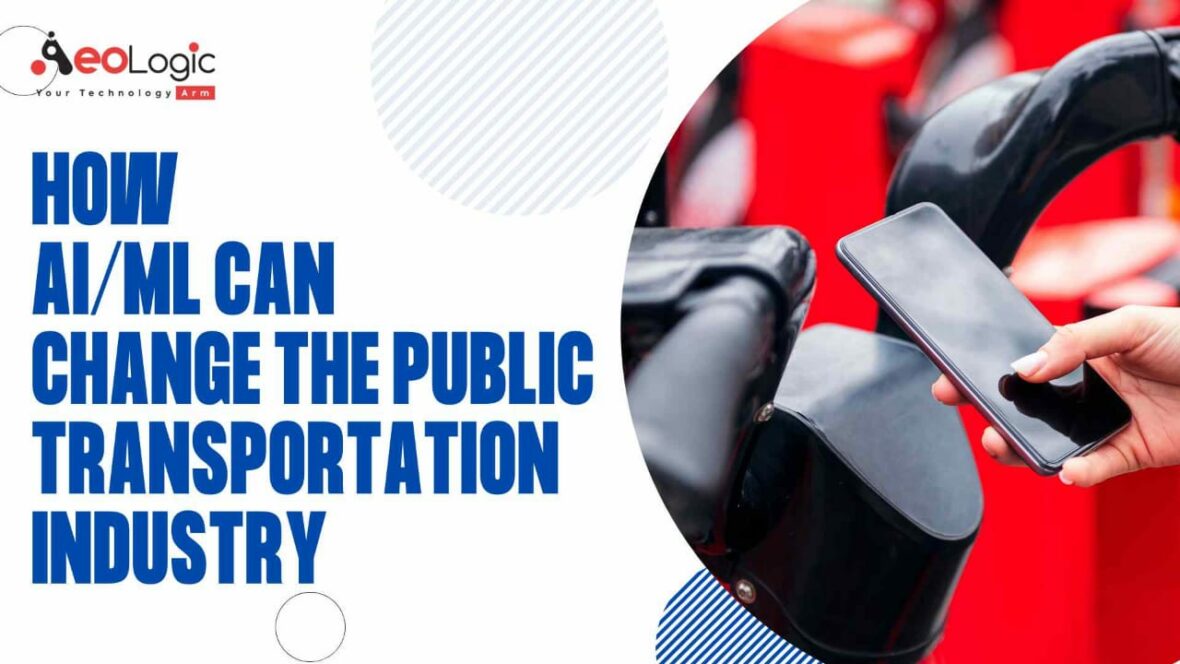The transportation industry is on the cusp of a major transformation. With the advent of autonomous vehicles and the rise of ride-sharing services, the way we get around is changing rapidly. The public transportation industry has been slow to adapt. It is beginning to embrace new technologies like artificial intelligence (AI) and machine learning (ML). In this blog post, we’ll take a look at how AI/ML can change the public transportation industry. Also, we will look at what benefits it could bring. We’ll also discuss some benefits that need to be addressed before this technology can be widely adopted.
Outline
- How AI/ML is used in transportation today
- Benefits of AI/ML in transportation
- AI/ML issues in the transportation sector
- Future of AI/ML and transportation
- Conclusion
How AI/ML is Used in Transportation Today
Machine learning (ML) and artificial intelligence (AI) are changing how transportation companies do business.
Transportation is changing at an incredibly rapid pace. In a few years, the way we think about transportation has changed dramatically. We’ve seen the rise of ridesharing, autonomous vehicles, and more recently, flying cars.
The transportation industry is ripe for disruption by emerging technologies such as artificial intelligence (AI) and machine learning (ML). And today’s transportation startups are taking advantage of these technologies. They are developing new ways to get us where we need to go.
The utilization of AI and ML in public transportation has made it more efficient as well as safer. Through deep learning with AI, we are able to solve several issues like:
- Traffic of vehicles
- Pollution caused by vehicle emissions,
- and road accidents.
The Olympic committee announced that Toyota e-Palettes would be the self-driven bus system that will bring athletes from their hotels to the stadium during the 2020 Tokyo Olympics and back from the venue. Completely automated taxis are no doubt a big step toward autonomous driving. Also, these demonstrate a firm commitment toward this young appealing technology.
Also Read: How to Grow Business Through Blockchain Technology?
Benefits of AI/ML in Transportation
There are several benefits that come with artificial intelligence and machine learning, the most important of which is the ability to make decisions by leveraging past data.
- AI use will decrease traffic accidents and improve safety, The number of accidents involving truck drivers at night is a problem that can be helped with the introduction of smart unmanned vehicles. This is due to the personal & Financial costs involved from these types of accidents being sufficiently high as well as labor current workforces decreasing in jobs where people had previously been blamed for various reasons such as these suffered by industry players to ensure profits increasing in their perceptive.
- Unmanned vehicles will allow drivers to sleep without causing major accidents. Many AI trucks predict traffic and car health, detecting heart attacks and alerting medics automatically by monitoring the surrounding cars with their Smart Sensors.
- Artificial intelligence will create significant revenue streams for automakers, including self-driving technology, predictive maintenance, and route optimization. With fully artificial intelligence-motivated cars operating 24 hours a day, several new revenue streams come into play when you no longer have to pay drivers.
- AI/ ML technologies increase the ability to process and predict data and outcomes more than humans, so, travel and transport operators will schedule public and private transportation services in a significantly improved manner.
Today, there is an app for everything. Take Google maps for instance. The service combines AI-powered real-time traffic updates with location data collected from users’ smartphones to predict and analyze traffic conditions in your local area so as to better inform your travel plans.
Application development: Boost your business plans with customized applications.
AI/ML Issues in the Transportation Sector
Now that you’ve seen the benefits, it’s time to discuss the disadvantages of utilising AI to manage supply chains:
Lack of knowledge
Traditions cannot be instantly replaced. The entire process of adjusting to a new technology takes some time, and some skills must be learned. If someone chooses to pursue AI, they must ensure that they fully understand all of the relevant ideas, from software engineering to data science.
AI Requires Human Support
Despite having the ability to do tasks, AI is not a fully independent system. Human support and oversight are required to ensure efficient operation.
It’s Difficult to Spot an Error
AI intelligence is based on more than just handling data; it is also built on learning from experience and improving with each task. After some time, it becomes an unexpected checking framework, which is actually why it’s challenging to spot and identify errors when they occur.
Security Concerns
Artificial intelligence is often used by businesses to manage vast amounts of data that may contain sensitive information. If the firms don’t invest in high-quality security solutions, this might become a significant problem. Even one security blunder might have serious repercussions for the organizations.
Cybercrimes
In addition, as technology has advanced, there are now more of them in the world, putting businesses that rely on AI at risk. In order to secure the system from errors or cybercrime, it is crucial to maintain it updated.
Implementation
The application of such models is the other worrying issue. The organization’s some nations, particularly those in the third world, do not favor autonomous driving cars. Just launching self-driving cars would necessitate extensive reconstruction and adjustments.
Also Read: Why a Culture of Innovation Is Required in an Era of Digital Transformation
Future of AI/ML and Transportation
Smarter Automobiles
The automotive trade publication Ward’s Auto estimates that there are already more than 1.2 billion automobiles on the road, with the number anticipated to exceed 2 billion by 2035.But in the transportation sector of the future, new technologies will make driving safer. Modern automobiles are becoming more aware of the roadways and other nearby vehicles thanks to features like blind spot monitoring, adaptive cruise control, lane keeping technology, and collision avoidance. Rear-view cameras are one such feature.
Cars are also becoming more interconnected with one another. By warning drivers of traffic bottlenecks miles in advance, the linked automobile will enable communication between vehicles to improve collision avoidance and safer driving conditions.
Also Read: The Benefits of Cloud-Native Applications in Manufacturing
Intelligent Shipping With AI
Although shipping may not be as dangerous or as complex as driving during rush hour, AI is being used to improve shipping’s dependability, safety, and efficiency. The great bulk of items bought abroad are shipped in cargo containers and delivered by big ships. Machine learning is assisting in delivery route optimization and logistics improvement, saving time and money.
Autonomous and Intelligent Trains.
Since the London Underground introduced clever automation more than 50 years ago, trains have been equipped with intelligent technologies. The International Association Public Transport categorises trains into five Grades of Automation (GoA), from fully human-controlled to fully automated. Surprisingly, there are a lot of completely autonomous GoA Level 4 trains in use, from entire metro lines to airport shuttles. Fully autonomous vehicles are now a reality and are being used extensively in train operations.
AI/ ML Enhancing the Automation and Intelligence of Airplanes
When it comes to the adoption of AI/Ml in the transportation sector, aeroplanes have long been at the forefront, equipped them with automation and intelligent technologies. Since the introduction of automated flight systems, fly-by-wire controls, and autopilot technologies in cockpits decades ago, aeroplanes have essentially flown themselves. However, as recent events have demonstrated, there is still much that can be done to improve these systems’ intelligence and adaptability.
Big Data & Analytics: Remodeling your raw technical data towards clear business information
Conclusion
One of the most amazing technological advancements in human history has been artificial intelligence. Despite all of the incredible innovations that have been made thus far, it is crucial to remember that there is still much more to learn about AI. The aforementioned uses of AI in transportation are only a few examples of the chances and possibilities that the technology can present. Think about how fantastic and thrilling an AI-driven future would be!
If you are looking AI/ML technology for your business, connect with Aeologic Technologies to grow your business.






